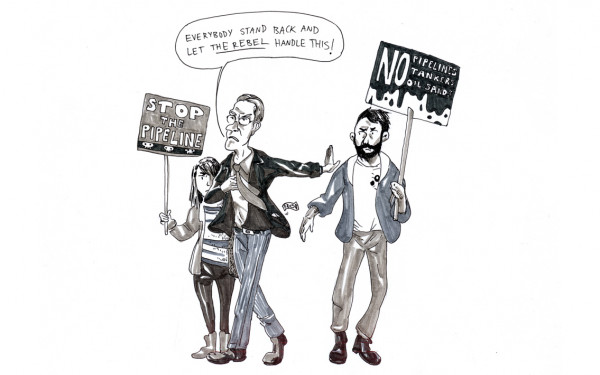Hundreds March Through Montreal for Missing and Murdered Women
Annual Demonstration Seeks Justice for Native Women
A crowd of around 700 waded through Montreal’s downtown core on Valentine’s Day for the Annual Memorial March for Murdered and Missing Women.
“Between us, we are capable of depending less on a police force and judicial system that continues to perpetuate violence,” Alisha Mascarenhas told the crowd. Mascarenhas is a member of Missing Justice, the grassroots solidarity group that organized the event.
“We should not have to wait on a government that remains passive, irresponsible and negligent. It’s up to us to defend ourselves against violence.”
__900_597_90.jpg)
Held across Canada, the memorial march pays homage to murdered and missing indigenous women and denounces violence perpetrated against those who identify as women anywhere in the world. The march began in 1991 in Vancouver, after the murder of a First Nations Coast Salish woman. The woman’s name is not spoken today out of respect for her family.
Over 600 indigenous women have been killed or gone missing in Canada since 1980, according to an estimate from the government-recognized Native Women’s Association of Canada.
Other activists count the number of deaths and disappearances closer to 3,000. More than half of the recognized cases remain unsolved.
The Montreal march was part of a larger speaker series, Thick Skin: Reflections on race, gender, and political resistance, happening at Concordia.
Around 6 p.m., the crowd grew at Parc Émilie-Gamelin, where a microphone was set up. Police cars lined the adjacent street as journalists’ cameras flashed, the park coated with fresh snow.
“Society at large is just as guilty as the institutions, because we do nothing to change,” said Anna-Aude Caouette from STELLA, a community resource group for sex workers.
She was one of multiple speakers who noted participants were standing on unceded Aboriginal territory, referring to North America as ‘Turtle Island’ according to Native oral tradition.
_900_600_90.jpg)
Caouette underlined how difficult it is for women who need help, saying native women often fear violence and discrimination from the government and its institutions.
“Police are not an option because they have killed and raped with impunity for far too long!” she told the crowd.
Maya Rolbin-Ghanie, founder of Missing Justice, read an open letter to the crowd.
The diverse crowd marched from Berri-UQAM Metro to Place-des-Arts along Ste. Catherine St.
Phil Rispe said he was marching for his friend Joelle, an aboriginal woman killed in Quebec City last summer. He said her case was never pursued.
“I just think in my head, ‘how is it possible for people to do that to another person?’” he said. Rispe is from Bolivia but lives in Montreal.
“Native murder is not important for the government. For the white people? ‘Oh, we need to make that so important on the front page.’ For the native people? ‘Fuck off.’”
_900_600_90.jpg)
Unsolved cases are what motivate repeated demands for a public inquiry to investigate the roots of systemic injustice in Canada.
The NWAC recently sent a petition of over 23,000 signatures to the House of Commons. In this year’s budget, the federal government renewed funding for existing public programs aimed to reduce violence against aboriginal women and girls. They have not replied about the inquiry, which activists equate with doing nothing.
Mascarenhas said a public inquiry is essential in terms of widening visibility, but that action shouldn’t stop there.
“If I have any primary concerns about a public inquiry, it would be on whose terms and in what framework would that inquiry be happening, and who would be doing the actual research involved,” she said.
“We can see that when research goes from being done by native-lead groups and then is handed over to the government, how they can have very different motivations—and come up with very different findings—that has different impacts.”
She said funding should go to native-led organizations “that are coming from the experiences of people who are directly affected by this kind of violence.”

_900_600_90.jpg)
_600_832_s.png)

1_600_375_90_s_c1.jpg)
_600_375_90_s_c1.jpg)
3_600_375_90_s_c1.jpg)
